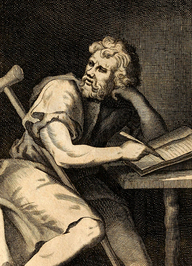 author
authorDiscover the Best Books Written by Epictetus
Epictetus was born nearly 2,000 years ago in Hierapolis (present-day Pamukkale in Turkey) as a slave in a wealthy household. Epaphroditus, his owner, gave him permission to pursue liberal studies, and it is how Epictetus discovered philosophy through the Stoic Musonius Rufus, who became his teacher and mentor.
Later, Epictetus obtained his freedom shortly after emperor Nero’s death and started teaching philosophy in Rome for nearly 25 years. This lasted until emperor Domitian famously banished all philosophers in Rome. Epictetus fled to Nicopolis in Greece, where he founded a philosophy school and taught there until his death.
After his death, Lucian tells us that someone bought Epictetus’s earthenware lamp for 3,000 drachmas (surprisingly enough, that same lamp was also mentioned later by James Joyce). But what is so special about the lamp? As Epictetus put it and provided an important Stoic lesson: “I keep an iron lamp by the side of my household gods, and, on hearing a noise at the window, I ran down.
I found that the lamp had been stolen. I reflected that the man who stole it was moved by no unreasonable motive. What then? Tomorrow, I say, you will find one of earthenware. Indeed, a man loses only that which he already has.”
Epictetus’ strong and wide-ranging influence can be seen in multiple instances. Marcus Aurelius, in Meditations, thanks his teacher Junius Rusticus for introducing him to Epictetus. There is a slight probability that Rusticus actually attended Epictetus’ lectures and passed his own notes to Marcus. Yet the most likely thing is that Marcus read the widely circulated notes by Epictetus’s student Arria, which we will discuss below.
Best author’s book

























